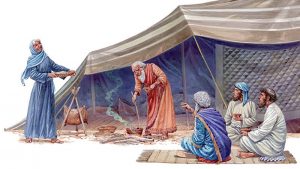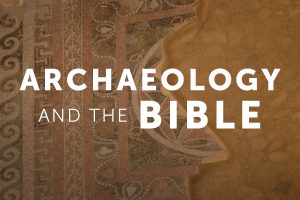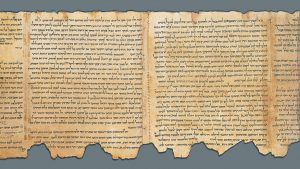
Shownotes
Wisdom-Trek / Creating a Legacy
Welcome to Day 1311 of our Wisdom-Trek, and thank you for joining me.
I am Guthrie Chamberlain, Your Guide to Wisdom
Mastering the Bible – Theophany and Archaeology – Worldview Wednesday
Wisdom - the final frontier to true knowledge. Welcome to Wisdom-Trek! Where our mission is to create a legacy of wisdom, to seek out discernment and insights, to boldly grow where few have chosen to grow before. Hello, my friend, I am Guthrie Chamberlain, your captain on our journey to increase Wisdom and Create a Living Legacy. Thank you for joining us today as we explore wisdom on our 2nd millennium of podcasts. This is Day 1311 of our Trek, and it is Worldview Wednesday. Creating a Biblical Worldview is important to have a proper perspective on today’s current events. To establish a Biblical Worldview, it is required that you also have a proper understanding of God and His Word. Our focus for the next several months on Worldview Wednesday is Mastering the Bible, through a series of brief insights. These insights are extracted from a book of the same title from one of today’s most prominent Hebrew Scholars, Dr. Micheal S. Heiser. This book is a collection of insights designed to help you understand the Bible better. When we let the Bible be what it is, we can understand it as the original readers did, and as its writers intended. Each week we will explore two insights.
Mastering The Bible – Theophany, and Archaeology
Insight Thirty-Three: God Was Present in Human Form in the Old Testament
 The time of Jesus wasn’t the first time in the Bible that God appeared on earth as a man. There are several places in the Old Testament where God comes in human form —even to the point of embodiment. In fact, these appearances became reference points for New Testament writers to talk about Jesus.
The time of Jesus wasn’t the first time in the Bible that God appeared on earth as a man. There are several places in the Old Testament where God comes in human form —even to the point of embodiment. In fact, these appearances became reference points for New Testament writers to talk about Jesus.
For example, in several passages, the “word of the Lord” appears to prophetic figures like Abraham (Genesis 15:1, 4), Samuel (1 Samuel 3:1, 7, 21), and Jeremiah (Jeremiah. 1:2, 4, 11). In these instances, the “word of the Lord” was visible. In other words, the reference is not just to a voice inside the head. In Jeremiah's case, the “word of the Lord”—identified as God himself in the passage—reaches out his hand and touches the prophet as we read in Jeremiah 1:9 Then the Lord reached out and touched my mouth and said, Look, I have put my words in your mouth!
These passages and others like them are where the apostle John gets his idea that Jesus was “the word” who was God—the word made flesh. Let me read John 1:1-3, 14
In the beginning the Word already existed.
The Word was with God,
and the Word was God.
He existed in the beginning with God.
God created everything through him,
and nothing was created except through him.
So the Word became human and made his home among us. He was full of unfailing love and faithfulness. And we have seen his glory, the glory of the Father’s one and only Son.
Further evidence for God in human form in the Old Testament is the Angel of the Lord. In Exodus 23:20-21, God tells Moses:
See, I am sending an angel before you to protect you on your journey and lead you safely to the place I have prepared for you. Pay close attention to him, and obey his instructions. Do not rebel against him, for he is my representative, and he will not forgive your rebellion. The word translated “angel” in the Old Testament means “messenger,” and so the “angel of the Lord” is a divine being sent to do a particular task. The key thing to notice in Exodus 23 is that this particular angel has the representation of God in him. Other passages make it clear that this is another way to refer to God himself. For example, the angel with God's name in him was assigned by God to lead the Israelites to the promised land. Judges 2:1-3 tells us that the angel accomplishes that task. But in Deuteronomy 4:37-38, we read that God took Israel out of Egypt and defeated her enemies to conquer the land through God’s “presence.” In other words, God’s presence was in the angel. Interestingly enough, in the New Testament, Jude 5 shows Jesus delivering the Israelites from Egypt and defeating their enemies! The phrase “The angel of the Lord” appears nearly 80 times in the Bible. Most of these occurrences were in bodily form, the pre-incarnate Christ.
The word translated “angel” in the Old Testament means “messenger,” and so the “angel of the Lord” is a divine being sent to do a particular task. The key thing to notice in Exodus 23 is that this particular angel has the representation of God in him. Other passages make it clear that this is another way to refer to God himself. For example, the angel with God's name in him was assigned by God to lead the Israelites to the promised land. Judges 2:1-3 tells us that the angel accomplishes that task. But in Deuteronomy 4:37-38, we read that God took Israel out of Egypt and defeated her enemies to conquer the land through God’s “presence.” In other words, God’s presence was in the angel. Interestingly enough, in the New Testament, Jude 5 shows Jesus delivering the Israelites from Egypt and defeating their enemies! The phrase “The angel of the Lord” appears nearly 80 times in the Bible. Most of these occurrences were in bodily form, the pre-incarnate Christ.
Genesis 48:15-16 makes this explicit. When Jacob blessed Joseph’s children, he prayed:
Then he blessed Joseph and said,
“May the God before whom my grandfather Abraham
and my father, Isaac, walked—
the God who has been my shepherd
all my life, to this very day,
the Angel who has redeemed me from all harm—
may he bless these boys.
May they preserve my name
and the names of Abraham and Isaac.
And may their descendants multiply greatly
throughout the earth.”
The text doesn’t read, “may they bless the boys,” but “may he bless the boys.” The wording treats God and the angel as one. There are other passages that show God in human form before Jesus. God wasn’t born of a woman in these passages, but they prepared people for that event.
Insight Thirty-Four: Archaeology Can Validate but Not Prove the Bible
 Many Bible students are fascinated by archaeology. There’s a certain mystique about recovering something hidden from human eyes for thousands of years. Archaeological discoveries can tell us a lot about the past. Artifacts can tell us something about how people lived. Texts can tell us what they thought or saw. Because archaeology provides these windows into the past, it’s important for understanding the Bible.
Many Bible students are fascinated by archaeology. There’s a certain mystique about recovering something hidden from human eyes for thousands of years. Archaeological discoveries can tell us a lot about the past. Artifacts can tell us something about how people lived. Texts can tell us what they thought or saw. Because archaeology provides these windows into the past, it’s important for understanding the Bible.
Unfortunately, what archaeology can do for the Bible is often overstated. Popular apologetics books talk a lot about how archaeology “proves” the Bible, but that’s misleading. While it’s true that the names of biblical characters have been found on tablets and inscriptions, archaeology has never produced a text or artifact that precisely points to any biblical character before the time of David. For example, finding “Jacob” inscribed somewhere isn’t necessarily a reference to the biblical character. A lot of people at the time could have borne that name.
Does that mean that there is no archaeological evidence for Bible characters like Abraham, Isaac, Jacob, Joseph, Moses, Joshua, Gideon, Samson, and Samuel? Yes. But the issue needs to be framed differently. If we ask, “Does that mean that there is no archaeological evidence for the events, historical circumstances, lifestyle portrayals, and religious beliefs of those biblical characters?” the answer would be the polar opposite. Archaeology has produced a lot of evidence that demonstrates the details of biblical stories are quite plausible (e.g., marriage customs and treaty structures). It has also produced artifacts that show a biblical detail about history was correct even though correlating proof was lacking for many years (e.g., Belshazzar’s rule over Babylon). These achievements are important for defending biblical validity.
Something archaeology can never do. though, is prove the theological statements of the Bible. You can’t dig up God. Even if archaeologists find the walls of the biblical Jericho toppled down and burned (and some would say they have), Jericho’s ruins cannot prove that God knocked them down. That's a theological assertion. Since God's existence and power is beyond the realm of science, they are also beyond the realm of archaeology. The coherence of the Bible’s truth claims it needs to be defended on other grounds, such as sound logic.
Archaeology is a valuable tool for validating the circumstances of biblical events. It is dangerous, however, to exaggerate its contribution. Claims that overstate evidence are bound to be overturned. Theological truths should not be put in jeopardy by careless apologetics.
That will conclude this week’s lesson on another two insights from Dr. Heiser’s book “Mastering The Bible.” Next Worldview Wednesday, we will continue with two additional insights. I believe you will find each Worldview Wednesday an interesting topic to consider as we build our Biblical worldview.
Tomorrow we will continue with our 3-minute Humor nugget that will provide you with a bit of cheer, which will help you to lighten up and live a rich and satisfying life. So encourage your friends and family to join us and then come along with us tomorrow for another day of ‘Wisdom-Trek, Creating a Legacy.' If you would like to listen to any of our past 1310 treks or read the Wisdom Journal, they are available at Wisdom-Trek.com. I encourage you to subscribe to Wisdom-Trek on your favorite podcast player so that each day’s trek will be downloaded automatically.
If you would like to listen to any of our past 1310 treks or read the Wisdom Journal, they are available at Wisdom-Trek.com. I encourage you to subscribe to Wisdom-Trek on your favorite podcast player so that each day’s trek will be downloaded automatically.
Thank you so much for allowing me to be your guide, mentor, and, most of all, your friend as I serve you in through this Wisdom-Trek podcast and journal.
As we take this Trek together, let us always:
- Live Abundantly (Fully)
- Love Unconditionally
- Listen Intentionally
- Learn Continuously
- Lend to others Generously
- Lead with Integrity
- Leave a Living Legacy Each Day
I am Guthrie Chamberlain….reminding you to ’Keep Moving Forward,’ ‘Enjoy your Journey,' and ‘Create a Great Day…Everyday’! See you Tomorrow!